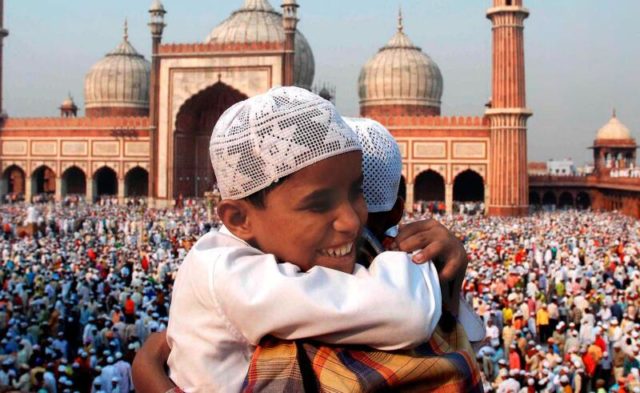Eid al-Fitr, also called the “Festival of Breaking the Fast”, is a religious holiday celebrated by Muslims worldwide that marks the end of the month-long dawn-to-sunset fasting of Ramadan.
WHILE the Islamic calendar celebrates two different Eid festivals throughout the year – Eid ul-Fitr and Eid ul-Adha – both are celebrated for very different reasons.
Eid ul-Fitr is a three-day celebration that takes place at the end of the Holy month of Ramadan, at the start of Shawwal, the 10th month of the Islamic calendar; Eid ul-Adha takes place following the annual Hajj pilgrimage on the 10th day of the 12th month, Dhu al-Hijjah.
What Does Eid ul-Fitr Mean?
So, what is Eid? When directly translated, the Eid meaning is “the festival of breaking the fast” and commemorates the end of a month-long fast throughout Ramadan for Muslims in South Africa and around the world.
The festival is a very important time in Islam and allows families, loved ones and communities to come together and celebrate following a month of abstinence and dedication to Allah.
This is important because it marks the end of Ramadan, the month in which the Holy Qur’an was first revealed to Prophet Mohammad. Throughout Ramadan, Muslims around the world undertake a fast between the hours of sunset and sunrise and spend a lot of time in self-reflection while studying the Qur’an and connecting with Allah on a spiritual level.
After a full month of sacrifice and dedication, Eid ul-Fitr is a time to come together with family and loved ones to enjoy everyday blessings.
“The month of Ramadan is that in which was revealed the Qur’an, a guidance for the people and clear proofs of guidance and criterion. So, whoever sights the new moon of the month, let him fast it; and whoever is ill or on a journey – then an equal number of other days. Allah intends for you ease and does not intend for you hardship and wants for you to complete the period and to glorify Allah for that to which He has guided you; and perhaps you will be grateful.” – Quran 2:185
When is Eid ul-Fitr 2021?
Many people ask, “what date is Eid?” and the exact date varies year to year, because of the rotational nature of the lunar calendar.
The Eid 2021 date is anticipated to fall in the evening of Wednesday 12th May after Ramadan, however, this is dependent on the sighting of the moon, so it’s always best to check with your local Mosque for confirmation nearer the time.
The exact date of Eid ul-Fitr normally varies across the world; there are some communities who choose to retain consistency and celebrate at the same time by declaring Eid 2021 once the new moon has appeared above Mecca.
Why is Eid Celebrated?
Eid ul-Fitr is celebrated following a successful month of abstaining from both food and drink during daylight hours; this takes a lot of self-control and dedication to bring oneself spiritually closer to Allah through prayer and worship in commemoration of the month when the Qur’an was first revealed.
To celebrate a full month of fasting in this way, Eid ul-Fitr is a joining together of family, friends, and communities to feast and enjoy the food that has been provided by Allah.
Ways to celebrate Eid
Eid-ul-Fitr festival is an important way to mark the end of Ramadan, however, before the festivities can begin, there are a number of important rituals that must first take place to give true thanks to Allah for all he has done.
Dawn prayers – also known as Fajr – are performed with your family before the “ghusl” cleansing, which purifies the whole body. After the cleansing or ablution, the family prepares for the day, by wearing the finest clothes they own, or new clothes they have bought for the occasion.
Families then head over to the local mosque to wish friends, family and the local community “Eid Mubarak” which is the traditional Eid greeting. The Eid Mubarak meaning is translated to “blessed feast/festival”, but it is also used in the context of “happy Eid” and “blessed celebration”. After the greetings are said, Eid prayers begin.
Zakat ul-Fitr, or Fitrana, is a charity donation which must be made before Eid prayers commence, as this is distributed amongst the neediest to ensure they can take part in Eid festivities.
It’s also traditional to exchange gifts during the Eid celebration, particularly between young children and close family members. This holiday is also known as “The Lesser Eid” or “Sweet Eid” due to the increased number of sweet snacks available, and also because this day holds less importance in the Islamic calendar than Eid ul-Adha.
“Worship God and join none with Him in worship, and do good to parents, kinsfolk, orphans, the poor, the neighbour who is near of kin, the neighbour who is a stranger, the companion by your side, the wayfarer (you meet) . . . verily, God does not like such as are proud and boastful.” – Quran 4:36
Preparing for Eid ul-Fitr
Eid is a joyous time and many Muslim communities look forward to the celebrations with eagerness. Eid charity donations are commonly made at this time of year, whether as Zakat donations or Zakat ul-Fitr.
“Those who believe, and do deeds of righteousness, and establish regular prayers and regular charity, will have their reward with their Lord. On them shall be no fear, nor shall they grieve.” – Quran 2:277
– SOURCE: www.muslimaid.org








